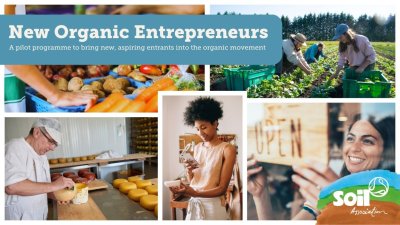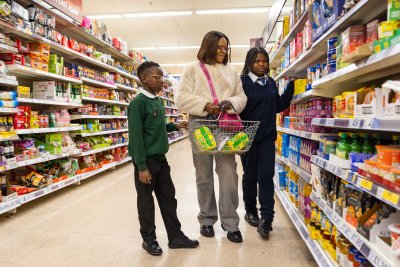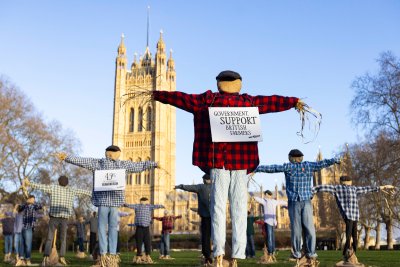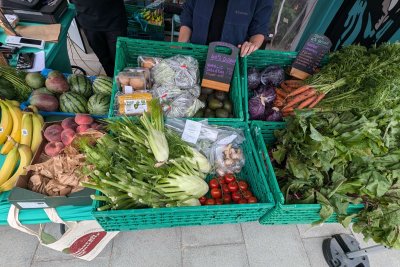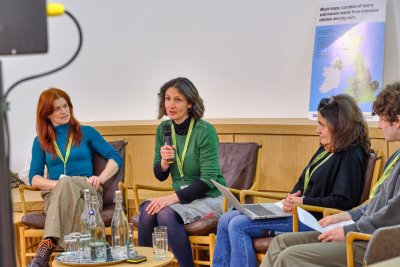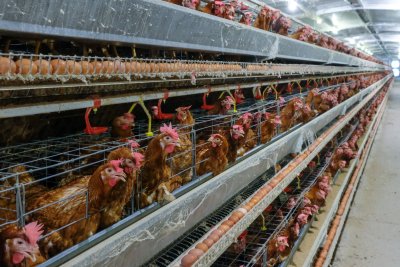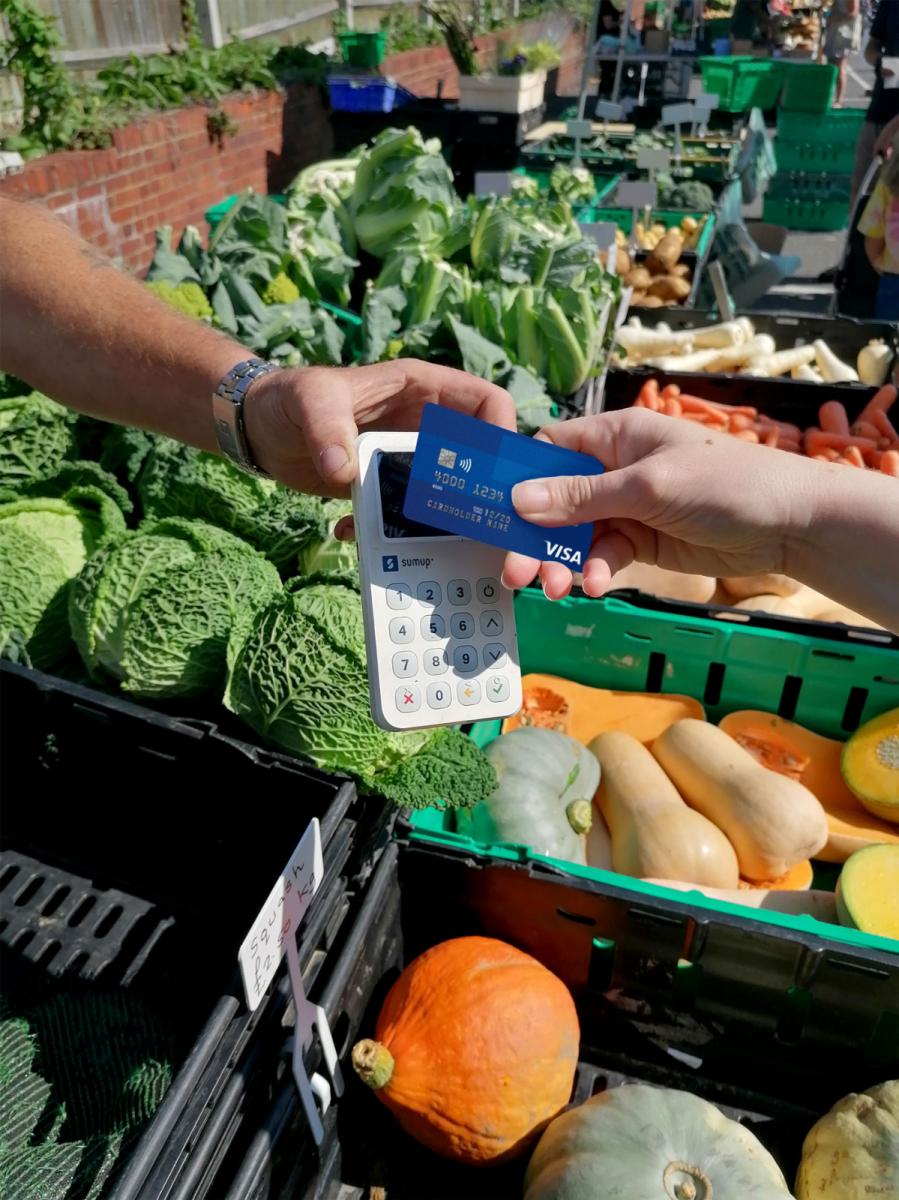 Credit: Ben Reynolds
Credit: Ben Reynolds
Beyond Rishi’s Meal Deals: How rethinking food and farming can really help kickstart the economic recovery.
Sustain’s deputy chief executive, Ben Reynolds, explores how Government could combine inventive investment and policies to boost the economy whilst also meeting strategic aims on health, climate and nature.
From fishing to food factories, from barns to bars, food and farming is the UK’s largest employer, with 4.1 million people working in this sector in 2018. Or put a different way it’s 1 in 7 of the UK’s workforce. It has the biggest manufacturing sector (valued at £121 billion) with food exports valued above £23 billion. In previous recessions it has been one of the most resilient sectors, and is likely to prove so again as we move into a period of economic instability, which many predict will see mass unemployment. Yet, in discussions of an economic recovery, food and farming has barely featured. Rightly, much airtime has been given to the idea of a green recovery, but little to how the UK’s largest employer could contribute to this. The Prime Minister has announced his desire to battle the nation’s bulge, with the government’s obesity strategy, but so far there has been little profile to ideas of how economic investment in healthier food could help achieve this. Quite the opposite, with the Chancellor’s Eat Out to Help Out restaurant discounts over August seeming to contradict, or at least offset any good intentions folk might have in improving their diets.
But it’s easy to overlook the fact it was inventive, and well received by the public and many in the catering and hospitality sector. So rather than bulge back bigger, what other ideas could food and farming bring to the table to help the country to build back better? Certainly a call for discounted meals wasn’t among food and farming industry recommendations when the scheme was announced. Rather their calls were for support to produce more domestically to increase employment, produce healthier food and drink, and to reduce its impact on the environment and animals. Even if the detail differs, Sustain’s headlines would probably be similar. But the main headline we would all agree on is that food and farming needs to be at the heart of the economic recovery. The Department for Business, Energy and Industrial Strategy (BEIS) recently set up a process to get ideas to support an economic recovery around a set of themes including: a green recovery; increasing opportunity for everyone, everywhere; skills and apprenticeships, innovation and investment; and backing new business. Good food and farming could deliver on all of these in spades.
Following a multitude of Government consultations on this same theme, Sustain today releases a briefing including a raft of ideas that, as the title says, could start Putting good food jobs at the heart of the economic recovery, a few of which we detail below:
Sustainable Farming and Fishing
Changing the way we farm and use land could allow the UK to produce more of our own food, to a better quality, and provide more land-based and food processing jobs. This is the perfect time to do so. The government is embarking on a new system for how it supports farming as the UK leaves the EU Common Agriculture Policy (CAP). The proposed new Environmental Land Management Scheme (ELMS) in England, farm support schemes in the nations, and other policies, such as a National Nature Service, could deliver on these aims. If well designed, the majority of farmed land could and should be delivering environmental, heritage, public engagement, and other outcomes with taxpayer support. There should be a commitment to maintain the current level of farm support at £3 billion per year for ELMS beyond this Parliament to provide long-term security and forward planning for farm businesses. This should be alongside investment in key areas where growth would support Government’s green economic recovery aims, including new entrants, horticulture, peri-urban agriculture, infrastructure for agro-ecological production and appropriate tech jobs such as research and demonstration of innovative farming and new low-impact technology such as the Small Robot Company. We need farm support to ensure all sizes of farm business can survive and thrive.
Additionally, to meet the challenges of the climate and nature emergency we can shift production by increasing demand for certified-sustainable produce, be it Organic, RSPCA-assured, LEAF-Marque, Biodynamic, Pasture-Fed, Marine Stewardship Council, and Aquaculture Stewardship Council amongst others. The case for investment to increase conversion to these schemes is stronger when considering the markets this might open up: through both exports, where internationally recognised certification will command higher prices than it simply being British; and domestic markets, such as the public sector, where high procurement standards e.g. for fish, mean that uncertified UK fisheries cannot sell their produce.
The climate and nature emergency is not just restricted to land. With many coastal communities also being some of the most deprived in the UK, we need to find solutions that both restore our marine environments and provide decent livelihoods. Too often have parts of the conversation lobby and fishing industry been pitted against each other to gain headlines. Investment in data collection, supporting certification, alongside reallocation of fishing quota will create prosperous and bountiful fisheries, with wealth distributed better around the UK and could create thousands of jobs.
Manufacturing and the circular economy
The concept of a circular economy should be at the heart of any economic recovery, but particularly a green one. A circular food economy means keeping value in the food chain on by-products or elements that would otherwise go to waste. This therefore goes beyond ideas of redistributing surplus food for free, as important as this is. It helps to put an economic value on these products, which can create jobs whilst also benefitting the environment by reducing waste or landfill. There needs to be more support to scale up or replicate these businesses and move them into the mainstream. Some notable areas are those turning fruit and veg that would go to waste into soups, smoothies, sauces, preserves or fruit leathers (see Rubies in the Rubble, ChicP and Spare Snacks). For many of those products that can’t be turned into something edible for humans, we can make better use of them for animals than we are currently doing by turning them into Ecofeed. The USA, New Zealand, Japan and Australia all allow heat-treated surplus animal protein in non-ruminant feed, and leaving the EU will allow us to define our own rules and innovate on use of food waste for animal feed. A new UK ‘surplus food-to-feed’ industry would create green jobs and new business opportunities spread across the UK .
Also there are those turning bread and baked goods past their best into beer (see Toast Ale), and looking abroad in Denmark they are closing this loop further by using spent grain from brewing and distillation into snacks, flour, and ultimately bread again – closing the loop (see Agrain and Circular Food Technology). This is the green innovation and technology that the UK needs to invest in and to become mainstream. We would love to see these techniques become a standard part of our baking industry and they could sit alongside our proposals for an Honest Crust Act. This would see bread labelling overhauled to remove one of the barriers to growth of small Real Bread bakers who have to compete with misleading labelling, where currently-unregulated terms such as fresh, wholegrain, artisan and sourdough can be used by larger manufacturers and retailers on products that don’t have the benefits associated with them, with little to no scrutiny . Assuming that some of that market demand would shift with these products, rather than solely rely on convenience, a change in the labelling regulations would create a more level playing field upon which, those smaller businesses could create and support more jobs, as many provide more jobs per loaf.
Retail and Catering
The lockdown measures have seen a decimation of the hospitality and catering sector and, with it, for options for its wholesale suppliers, many of whom were unable, unwilling or unsupported to switch or scale up to supply supermarkets. Instead, some set up online retail ordering services to sell direct to customers, though usually at a smaller scale than their previous lines of business . Any measures to help support catering, should be done by prioritising support for those selling healthier and sustainable options, such as those working with Food for Life. Focused investment should particularly go to support public sector caterers to do this, but also to support British producers, thus amplifying the economic benefits. The ethos of the Preston model, with its focus on local supply, should be applied this more widely to food procurement, as has been done recently in the South West by Councils working with Fresh Range, a successful digital platform enabling sourcing from smaller suppliers within larger contracts.
A lack of diversity in the supply chain and market options for producers is creating a less resilient food system in the UK, with over 95% of groceries sold through just 9 multiple retail chains, with a mere 3.7% of the market share held by alternative retailers. A focused drive on supporting supply chain diversity particularly in retail will help reverse the decline in small farms and diversity along the supply chain, and with it open up many new job opportunities. A target e.g. of 10% market share, and associated policies and investment should drive development of new routes to market and a growth in street, farmers’ and covered markets, co-ops, box schemes, and independent shops. This would help address many of the problems for smaller farm businesses, as well as supporting local economies and improving access to healthier, affordable food. A special focus should be given to increasing the number of Better Food Traders that are -by mission and design - able to deliver a fairer system for producers and workers, as well as for the planet.
We cannot ignore the dietary needs of older people. Prior to the Covid-19 pandemic more than 1.3 million people over 65 in the UK were malnourished or at risk of malnutrition1. Investment in a modernised meals on wheels service could provide a valuable strand of social care that would create dispersed employment around the UK, reduce costs for the NHS, and provide a better level of care for our old and vulnerable people.
But these proposals barely scratch the surface of what sustainable food and farming could offer to stimulate an economic recovery. We want to start a conversation that gets people talking about #goodfoodjobs, like those we advertise on RootsToWork, and that go beyond talk, to ideas, proposals and plans; that could help sectors to overcome barriers to unlock potential with the right investment and policies; that can start to quantify the benefits at a national level, through to a community or constituency level. So read our briefing and let us know what you think.
Sustainable Farming Campaign: Sustain encourages integration of sustainable food and farming into local, regional and national government policies.
Sustain
The Green House
244-254 Cambridge Heath Road
London E2 9DA
020 3559 6777
sustain@sustainweb.org
Sustain advocates food and agriculture policies and practices that enhance the health and welfare of people and animals, improve the working and living environment, promote equity and enrich society and culture.
© Sustain 2025
Registered charity (no. 1018643)
Data privacy & cookies
Icons by Icons8

